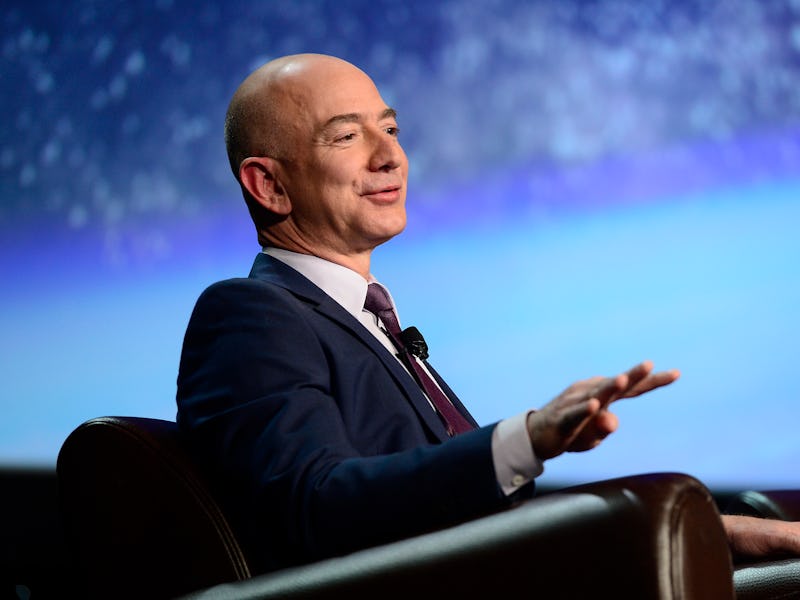Blue Origin's Jeff Bezos set to beat Elon Musk to space
The Amazon CEO looks set to beat his SpaceX rival on an important milestone.

Jeff Bezos is set to go to space, the Amazon CEO announced Monday.
The founder of spaceflight firm Blue Origin announced via his Instagram account that he will fly on the firm’s first crewed mission, scheduled for July 20 from its facility in West Texas. In an emotional video, Bezos is seen inviting his brother Mark to join him on the landmark flight. The pair will be joined by four other flight members, including the winner of an ongoing live auction.
“To see the Earth from space, it changes you,” Bezos said in the video. “I want to go on this flight because it’s a thing I’ve wanted to do all my life.”
Want to find out more about the emergent new space race, and competitors like SpaceX and Rocket Lab? Subscribe to MUSK READS+ for exclusive interviews and analysis about spaceflight, electric cars, and more.
It’s a landmark moment for Blue Origin, which has at times seemed a smaller player in the emergent space race. Although founded nearly two years before SpaceX, Elon Musk’s firm has attracted headlines with crewed flights to the International Space Station and regular satellite launches for clients.
But while SpaceX first flew astronauts into space in May 2020, it looks like Bezos will beat Musk to personally going to space. Musk has often mentioned eventual plans to go to Mars himself, and in 2018 even entertained the idea of going around the Moon in SpaceX’s planned 2023 mission.
The announcement comes as bidding continues on Blue Origin’s auction, which started on May 5 with a sealed online bidding system. Blue Origin announced Monday that bidding has already reached $2.8 million, with 6,000 auction participants from 143 countries.
It’s not the first milestone where Bezos has beaten Musk. In 2015, Blue Origin announced it had launched and landed the first-ever fully-reusable rocket.
Blue Origin flight: what is the plan for the first crewed New Shepard launch?
Six passengers will fly on the New Shepard rocket, named after the first American to go to space, Alan Shepard. The rocket features the BE-3 engine, powered by liquid hydrogen and oxygen, which generates 110,000 pounds of thrust at sea level. The whole vehicle is designed to vertically take off and vertically land, with the engine generating a much smaller 20,000 pounds of thrust as it comes in for a soft landing.
The capsule features giant windows, which Blue Origin describes as the largest windows in space. The windows are capable of transmitting 92 percent of visible light. The cabin measures 530 cubic feet.
The flight will last for roughly 10 minutes. Passengers will fly in a capsule past the Kármán line, the 100-kilometer-high border between the Earth’s atmosphere and outer space. As a suborbital flight, it will move in an arc, touching space before coming back down.
Although they won’t fly quite as far as SpaceX’s Crew Dragon missions, the passengers will be able to take off their harnesses and float around before their return to Earth for around three minutes.
The crewed flight will use the fourth New Shepard booster. This rocket first flew in January 2021 and completed a second flight in April 2021.
Blue Origin’s January 2021 flight, aimed at finessing the in-flight systems to make the launch as smooth as possible, gave an idea of what to expect. The firm released a diagram of how the mission worked:
Blue Origin's diagram of its flight.
While Bezos may be beating Musk to space, the SpaceX CEO has also expressed an interest in going to space. In December 2020, Musk said in an interview that he wants to die on Mars, the planet where he aims to build a city as early as 2050.
“Just not on impact,” Musk clarified at the time.
SUBSCRIBE TO MUSK READS+, A PREMIUM NEWSLETTER THAT COVERS THE WORLDS OF ELON MUSK, SPACEX, TESLA, AND EVERYTHING BETWEEN.
This article was originally published on